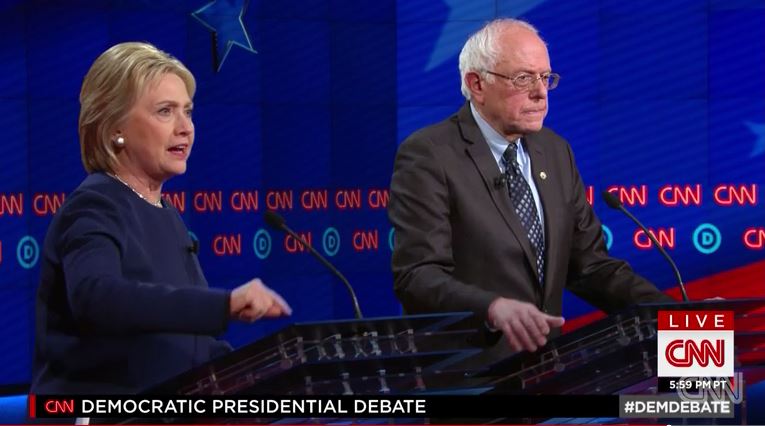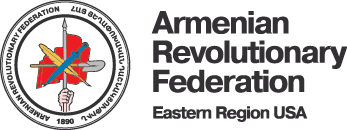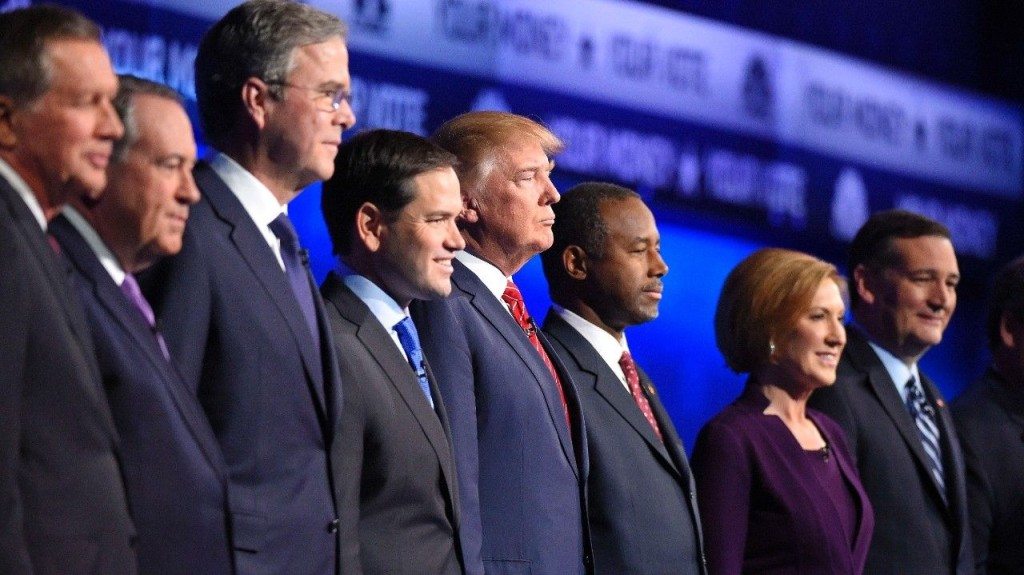Election 2016: Righteousness and Left-Leaning Progressivism

Special for the Armenian Weekly
As the presidential primary process has progressed, the importance of favoring progressive policies of the American left has only grown. A clear divide differentiates visions articulated by the left for a more just, tolerant, and peaceful America, and the right for a more hawkish, discriminatory, and deregulated America.
Previously, I argued that reigning in corruption, protecting human rights, and pursuing diplomacy over war marked three major touchstones in the American left that will benefit the United States, Armenia, and the Armenian Diaspora. This article extends the position and concludes that “Armenian issues” in the American political arena must not exist in a vacuum.

Democratic Party candidates Hillary Clinton and Bernie Sanders during a debate (Photo: CNN video capture)
Corruption: Inequality and Obstruction
An untempered stew of globalization, hyper-consumerism, and “trickle town” policies (thank you, President Reagan) has disproportionately benefitted top income earners. Wealth and power abound in the sectors of insurance, pharmaceuticals, oil, mining, real estate, weaponry, telecommunications, and information technology (among others). This trend has burgeoned juggernaut, private-sector multinationals—from Halliburton to Monsanto to Verizon—to harness their clout over elected officials and steer politics to sustain this unbalanced system. The Urban Institute reports that between 1963 and 2013, wealth inequality has spiked to favor the highest income earners while middle class wages stagnated. The evidence is overwhelming: America’s economy disproportionately serves top income earners in the private sector and not the middle class. Limiting government regulation upon the private sector, a policy prescription from America’s right, will not bring about the reforms necessary to fix this unsustainable trend.
Oligarchs have leveraged not just America’s economy, but also Armenia’s where a heightened version of the same system unfolds. Private corporations, many with roots in Russia, have plundered Armenia’s environment and middle class, putting the fragile nation in a downward spiral worsened by declining population, vanishing government regulations, and rising corruption. At nearly 18 percent of GDP, remittances render a false hope for Armenia’s future. Oligarchs hike rates, buy elections, and occupy key government posts, consolidating a system with little incentive to change. Obstructionism also deteriorates the rule of law’s integrity in both countries. In America, the current incarnation of this tension has unfolded with the vacancy of Justice Antonin Scalia’s Supreme Court chair. On the day of Scalia’s death, Senate Majority Leader Mitch McConnell (R-Ky.) said, “The American people should have a voice in the selection of their next Supreme Court Justice. Therefore, this vacancy should not be filled until we have a new president.” He went on to state that the right wing in the Senate would reject any nomination presented by President Obama despite the fact that article 2, section 2, clause 2 of the U.S. Constitution vests to the president the power to nominate Supreme Court judges.
This position sounds reasonable on the surface. It appeals to our buy-in with the democratic process and a sense of “people power.” However, the subtext points to a troubling willingness by the right wing to bypass the constitution for political gain in a historically unprecedented move. The last time the Supreme Court had a vacancy that lasted longer than a year was before the U.S. Civil War, and Obama still has more than enough time in his term to fill the vacancy. By denying the president his constitutional right, McConnell ironically exercised loose constructionism in the pursuit of further constitutional originalism. McConnell lacks the authority to place a time limit on Obama’s constitutional authority as president. Such actions exacerbate the corruption that flourishes in any political system—be it America’s, Armenia’s, Egypt’s, and beyond—where the rule of law can be bypassed by those with enough power. The entire right-wing presidential field supported McConnell’s declaration, confirming one of the many troubling issues with today’s American right-wing political culture of schoolyard obstructionism.
The United States and Armenia must both pursue reigning in this corruption, a complement or by-product of obstructionist oligarchs and political operatives. The presence of American diplomacy, academics, and development funds in Armenia means that the Armenian government has a “better way” towards which to pivot. Right now, Russian influence dominates the culture of Armenian government and society. This is not necessarily a bad thing, nor a surprise given Armenia’s location and history. Russia has become the last hope for economically marginalized Armenian citizens to find a better future, and Russia’s Armenian community has become the world’s largest and arguably wealthiest diaspora, sending in its own wave of resources to make improvements. However, the Russian state’s own practice of aggression and corruption in the region has affected its “little brother” in the South Caucasus. Regional tensions compel Armenia to reach out for assistance.
Can the United States offer Armenia a vision and opportunities more compelling than what Russia offers? It has, and it can continue to do so in a more pronounced way. One core value that must drive this relationship is the pursuit of better governing practices in the face of electoral fraud, widespread bribery, evisceration of the rule of law, and the many other forms of corruption that tarnish Armenia’s independence.
Human Rights: Discrimination, Hate Speech, and the High Road
The left wing has consistently stood on the forefront to advance America’s human rights record. Advocating for the legal protection of the disabled, laborers, women, African Americans, and beyond has been a fight to preserve humanity in the face of power, particularly when that power was derived from corrupt economic practices. In the mid-1800’s, for example, the American South became one of the world’s wealthiest regions thanks to ballooning cotton production yielded through slave labor. Slavery marked the South’s most precious labor commodity, and one of the major reasons why they refused to provide basic human rights to African Americans.
Today, the American South remains a hotbed for pockets of racist extremism. Look no further than Mississippi’s state flag that boasts within it the confederate flag, a controversial symbol of racism in the United States. Until last year’s horrific shooting in a predominantly Black Charleston church, South Carolina flew the confederate flag over its statehouse. Parks, streets, and towns throughout the South maintain the names of racist confederate war “heroes.” Imagine walking down a street called “Talaat Boulevard.”
Days ago, leading right-wing presidential contender Donald Trump embraced an endorsement from Sen. Jeff Sessions (R-Ala.), who gained notoriety for racist remarks against African-American colleagues and institutions. Then, Trump waffled on handling the support of former Ku Klux Klan Grand Wizard David Duke. Speaker of the House Paul Ryan (R-Wis.) and Sen. McConnell condemned Trump for doing so, underscoring the continued fracturing within the American right’s core identity. The likelihood of the GOP consolidating support around its eventual nominee is minimal at best. Consider Mitt Romney’s recent remarks.
Indeed, juxtaposing the rhetoric on the left and right can reveal the quality of character and thinking on both sides. On the left, contenders critique one another’s records on voting, policy positions, and public service. On the right, contenders have accused one another of wetting themselves, sweating too much, and wearing makeup. Yes, mudslinging has always colored electoral politics, but the exchanges on the right have degraded political discourse into a reality TV spectacle.
The right has not just levied rancorous rhetoric among its own ranks; they’ve taken aim at the left. For example, Marco Rubio’s attacks against President Obama defy reason. In a recent ad, Rubio suggested that Obama lacks the competence to address terrorist threats (Who took out Osama Bin Laden?) and that he plots to take guns away from Americans. Both claims lack evidence and reflect Rubio’s attempt to stir voters’ sentiments, not reason. This appeal to emotion reflects tactics that stretch as far back as the 1st century AD when Cicero stated, “Man is moved more by passion than by reason.” Hitler extended the claim: “Propaganda must be aimed at the emotions and only to a very limited degree at the so-called intellect.” Donald Trump also utilizes this strategy, especially in his degrading commentary towards women, Muslims, and many others (except Mussolini).
The right wing’s Islamophobic rhetoric is unsubstantiated and will only fuel the fire of anti-American sentiment among Islamic extremists. From the Spanish Inquisition to the Crusades to Israel’s ghettoization of Palestinians, every major faith group today bemoans dark chapters in its history. Most troubling is the notion that the majority of Muslims—some 1.6 billion people across the world—can be lumped into a single category worthy of suspicion. As the descendants of minorities subjected to hate speech and genocide, Armenians must summarily reject intolerance in all forms. Contrary to the right wing’s belief, the world is not in a grand struggle between Christianity, Judaism, and Islam. No, the world faces a grand struggle between moderates and extremists.
As the descendants of minorities subjected to hate speech and genocide, Armenians must summarily reject intolerance in all forms. Contrary to the right wing’s belief, the world is not in a grand struggle between Christianity, Judaism, and Islam. No, the world faces a grand struggle between moderates and extremists.
Corruption in the government and private sector limits accountability mechanisms that ensure elected officials promote the welfare of the entire society, not just loyalists. In such a system, human rights wither. A 2015 report by Human Rights Watch underscores how this corruption in Armenia has translated to infringements on freedom of assembly and expression; the implementation of torture and ill-treatment in custody; a culture of violence, abuse, and neglect in the military and psychiatric institutions; unnecessary restrictions on palliative care; and repeated hate crimes against those whose political, sexual, religious, and/or personality orientations insult conservative identity formulations. As (mostly) diasporan outsiders, we must consider what kind of value system we want our (American) public and private sector officials to represent during their time in Armenia, particularly as a compelling alternative to what Russia offers. The American left’s progress in protecting the basic human rights of its people has resulted in inspirational victories to uplift women, African Americans, people with mental illness, the excessively incarcerated, the poor, and beyond. No political faction is better positioned to offer Armenia a more tolerant social vision than the American left.
Diplomacy Trumps War: The Flaws of Engagement
From the war in Vietnam to the war in Iraq, the troubled history of American intervention offers a cautionary tale for how to consider the next administration’s engagement with the international arena. The fragility of the Middle East, Syria in particular, has disoriented Armenian communities the world over. American engagement in the Middle East has created more questions than it has answered, and no amount of aggressive posturing—a hallmark of the right—will resolve simmering tensions.
In 2015, the United States spent $598.5 billion, or 54 percent, of its discretionary spending on the military. To put that figure in perspective, it would take the combined annual military expenditures of China, Russia, Saudi Arabia, France, the United Kingdom, Germany, Japan, India, and South Korea to match the United States. No nation could ever topple America’s military might. However, today’s greatest threats to America come in the form of non-state actors like al-Qaeda and ISIS. What these bodies lack in finances (relative to the American military industrial complex) they make up for with zealot recruits cropped from communities of the economically and intellectually marginalized. Poverty and a lack of education lead to their radical ideologies taking root.
The United States cannot “carpet bomb” its way to erasing radical Islamic extremism. Such actions would extend the failed policies of the Iraq and Vietnam Wars, exacerbating resentment and scorn towards the United States. Instead, this country must utilize non-military foreign policy instruments, such as diplomacy and foreign aid, to lift millions out of poverty with education and economic opportunity. There is certainly enough wealth in the government’s budget and the nation’s economy to invest in such solutions.
Conclusion: A Vote for the Right Would Be a Vote for Corruption, Discrimination, and War
Placing “Armenian issues” into a vacuum places Armenian political and intellectual identity into a vacuum. These issues belong instead to a wider conversation about good governance (against corruption), human rights (opposing Aliyev’s Trumpesque rhetoric, for example), and international affairs (diplomacy trumps war). Some of America’s major diasporan institutions have simplified the process of evaluating candidates to a simple checklist on “Armenian issues,” often with the Armenian Genocide litmus test towering at the top.
Placing “Armenian issues” into a vacuum places Armenian political and intellectual identity into a vacuum. These issues belong instead to a wider conversation about good governance (against corruption), human rights (opposing Aliyev’s Trumpesque rhetoric, for example), and international affairs (diplomacy trumps war).
The candidates before us are not defined by their stance on “Armenian issues” alone, just as “Armenian issues” are not defined independent of their relation to wider considerations about the South Caucasus, the Middle East, Russia, and beyond. A presidential candidate’s full record must be analyzed to properly determine whether or not they possess the sound judgment to occupy the White House. For example, does Marco Rubio’s base rhetoric against Donald Trump and fear mongering false claims about Obama’s plans to steal guns in America really indicate someone fit to occupy the White House?
Rather than ask which candidate will make a declaration recognizing the Armenian Genocide or condemning Turkey, Armenians in America and throughout the diaspora should consider which candidates would be best positioned to promote an agenda that opposes corruption, uplifts human rights, and pursues peaceful resolutions to international conflicts. These touchstones of the American left can with greater effect and sustainability compel Turkey’s government to improve its human rights record, which may be the best hope for Turkey to recognize the Armenian Genocide and halt its record of state-sponsored discrimination against Armenians and other minority groups.
With the continued fragility of the Middle East and Russia’s regional aggression, Turkey will remain of strategic significance to the United States as a major partner in trade, military, and refugee processing. The next president, regardless of party affiliation, will not jeopardize this relationship by publicly recognizing the Armenian Genocide. American politicians can only deviate from the demands of the state so much. But they can leverage the state apparatus to promote values and ideologies through foreign aid, leadership, and civil society development. What’s more, centuries of the Turkish state’s neglect and discrimination towards the Armenian identity in Anatolia will not find catharsis in any act of Congress or presidential declaration.
The touchstones of the American left will also offer Armenia’s government—riddled with its own unsustainable corruption and discrimination—a “better way” towards which to pivot. The American right’s intolerant rhetoric towards Muslims, women, and immigrants would hardly put the United States in a position to lead an international coalition against corruption, discrimination, and war. Instead, we would become Vladimir Putin’s echo chamber.
In this presidential election cycle, a vote for the right would be a vote for corruption, discrimination, and war. That is not a winning formula—not for America, not for Armenia, not for humankind. I urge any and all major Armenian institutions, stakeholders, and individuals to support the cause of social harmony, righteousness, and left-leaning progressivism.
Source: Armenian Weekly Mid-West


